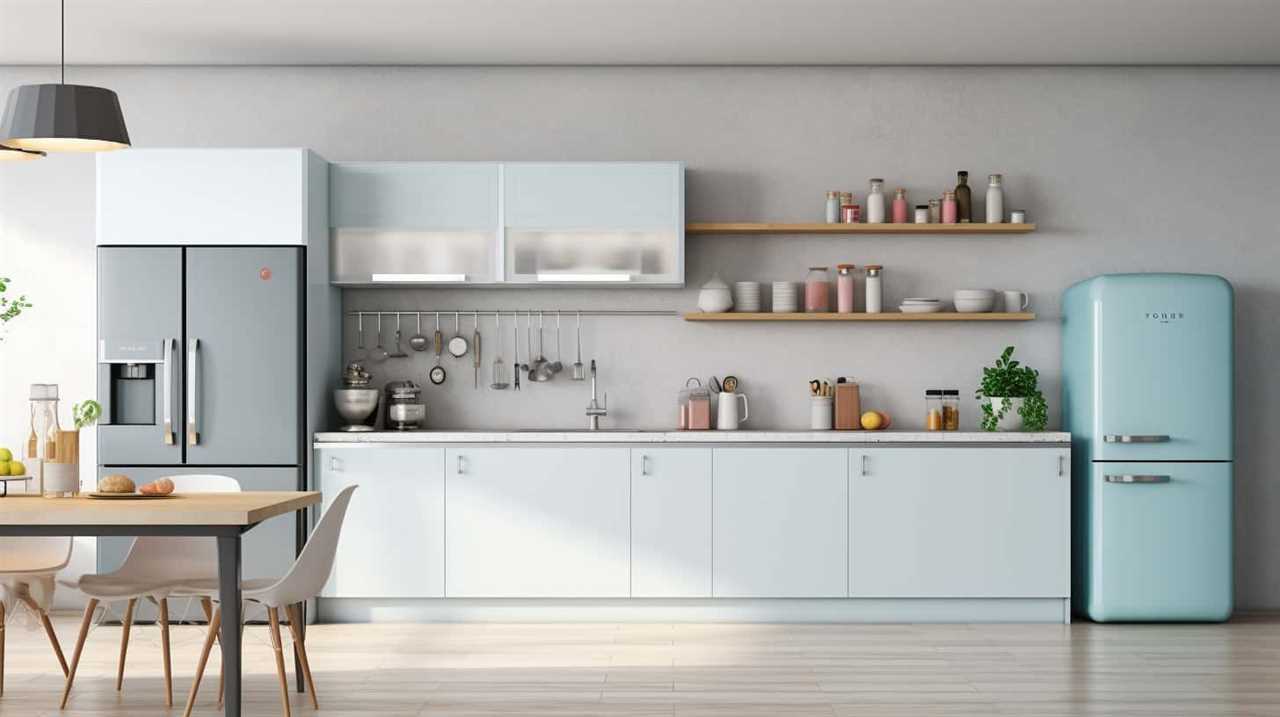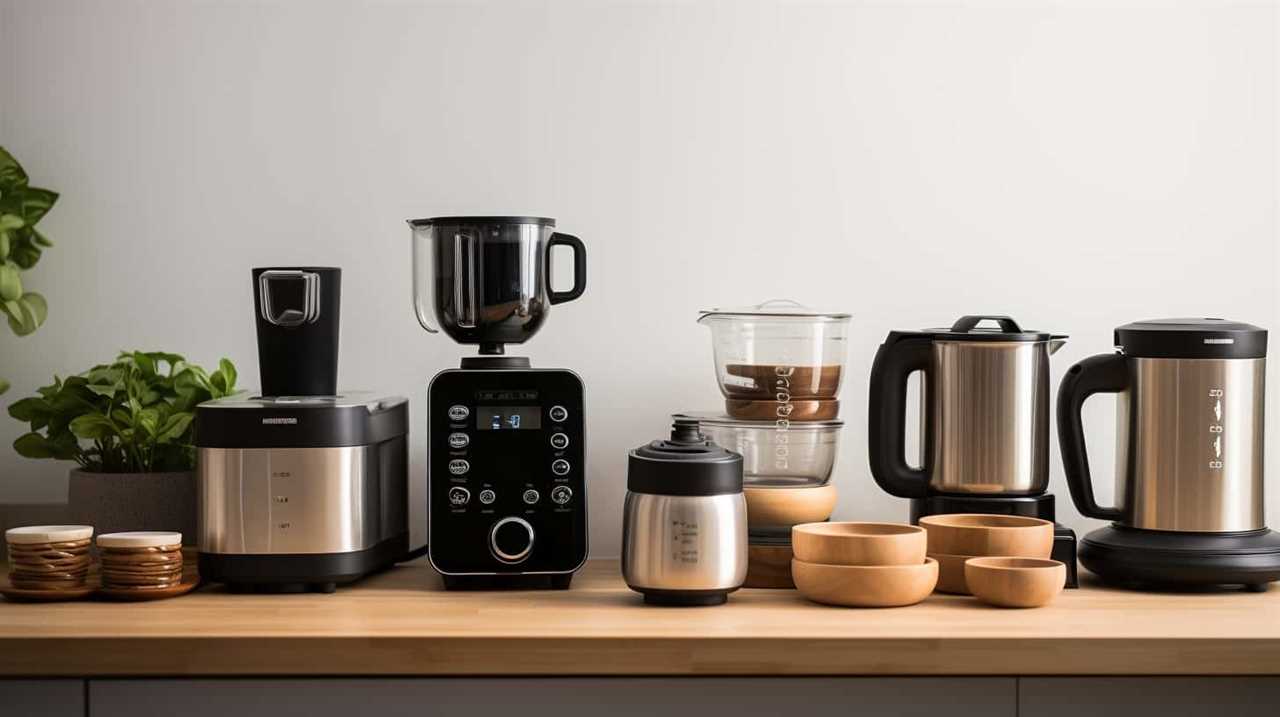In today’s modern world, appliances are essential for our daily lives, offering convenience, comfort, and productivity. Knowing how appliances use electricity is important for mastering energy management.
This professional guide aims to explore the intricate relationship between appliances and electricity consumption, shedding light on various aspects such as types of appliances, power consumption, energy efficiency ratings, standby power usage, and their impact on energy bills. Additionally, it delves into the emerging trends of smart appliances and their role in energy management, as well as the environmental impact of appliance usage.
By examining the importance of appliance maintenance and energy efficiency, this comprehensive overview equips readers with the knowledge needed to optimize their appliance electricity usage.
Key Takeaways
- Different appliances have varying power consumption levels.
- Energy efficiency ratings help consumers make informed decisions about appliance purchases.
- Choosing appliances with higher energy efficiency ratings reduces energy consumption.
- Standby power usage is a significant concern for households.
Types of Appliances
There are various categories of appliances that consume electricity in different ways. Understanding the types of appliances in your home is crucial to effectively manage your energy consumption.

The first category is large appliances, such as refrigerators, washing machines, and air conditioners. These appliances typically consume the most energy, so it is important to choose energy-efficient models and regularly maintain them.
The second category is small appliances, like toasters, coffee makers, and hairdryers. While they individually consume less energy, their combined usage can still add up. Unplugging small appliances when not in use and utilizing power strips can help reduce standby power consumption.
Lastly, there are electronics, including televisions, computers, and gaming consoles. Using power-saving features and turning off devices when not in use can significantly decrease energy usage.
Transitioning into the subsequent section, understanding the power consumption of these appliances is crucial in implementing effective energy-saving strategies.

Power Consumption of Appliances
Appliances vary in their power consumption, which is an important factor to consider when managing energy usage. Understanding the power consumption of different appliances can help individuals make informed decisions and optimize their electricity consumption.
One aspect to consider is the type of plug used by an appliance. Different countries and regions have varying plug types, and it is crucial to ensure compatibility to avoid unnecessary energy waste.
Another important consideration is the measurement of electricity consumption. Appliances often have a label or sticker indicating their power consumption in watts. This information allows users to estimate the energy usage and make comparisons between different appliances.
Energy Efficiency Ratings
Energy efficiency ratings play a crucial role in determining the energy consumption of appliances. These ratings provide valuable information about the efficiency of an appliance in converting energy into useful work.

Importance of Ratings
The significance of energy efficiency ratings in determining the performance of appliances cannot be overstated. Energy efficiency ratings provide consumers with valuable information regarding the energy consumption of appliances. These ratings are based on a thorough evaluation of the appliance’s energy efficiency benefits and its adherence to energy saving technologies. By considering these ratings, consumers can make informed decisions about the appliances they purchase, ensuring that they not only meet their needs but also contribute to a more sustainable future.
Energy efficiency ratings help consumers identify appliances that consume less energy, reducing their carbon footprint and saving them money on utility bills. Additionally, these ratings encourage manufacturers to develop and produce appliances that are more energy efficient, driving innovation in the industry.
Saving on Bills
Energy efficiency ratings help consumers lower their electricity bills by identifying appliances that consume less energy. These ratings provide valuable information about an appliance’s energy consumption and efficiency, allowing consumers to make informed decisions when purchasing new appliances.
By choosing appliances with higher energy efficiency ratings, consumers can significantly reduce their energy consumption and save on electricity costs.

When purchasing appliances, consumers should look for the Energy Star label, which indicates that the appliance meets strict energy efficiency guidelines set by the Environmental Protection Agency (EPA). Energy Star certified appliances are designed to use less energy without compromising performance, ensuring that consumers can enjoy the same level of functionality while reducing their environmental impact and saving on electricity bills.
Reducing energy consumption not only helps consumers save money, but it also contributes to a more sustainable future by reducing greenhouse gas emissions and conserving natural resources. By choosing energy-efficient appliances, consumers can play a significant role in creating a more energy-efficient society.
Environmental Impact
Appliance manufacturers are increasingly prioritizing energy efficiency ratings to minimize the environmental impact of their products. This shift is driven by a growing awareness of the need to reduce energy consumption and greenhouse gas emissions.
Here are three key ways in which energy efficiency ratings contribute to environmental sustainability:

- Energy saving initiatives: Appliances with higher energy efficiency ratings consume less electricity, thereby reducing overall energy consumption. This not only helps to conserve valuable natural resources but also reduces reliance on non-renewable energy sources.
- Reduced carbon footprint: Energy-efficient appliances emit fewer carbon emissions during their operation. By using renewable energy sources such as solar or wind power, the environmental impact of these appliances can be further minimized.
- Long-term cost savings: Energy-efficient appliances not only benefit the environment but also save consumers money through reduced energy bills. This incentivizes the adoption of energy-saving technologies and contributes to a more sustainable future.
Considering these factors, it is clear that energy efficiency ratings play a crucial role in mitigating the environmental impact of appliances.
In the next section, we will explore another aspect of energy consumption: standby power usage.
Standby Power Usage
Standby power usage is a significant concern for households due to its substantial impact on overall energy consumption. Many appliances, such as televisions, computers, and kitchen appliances, continue to draw power even when they are in standby mode. This standby power, also known as vampire power or phantom load, accounts for a significant portion of residential energy usage. To address this issue, manufacturers have implemented standby power reduction techniques and energy-saving standby features in their appliances.
The table below provides examples of common household appliances and their standby power consumption:

| Appliance | Standby Power Consumption (Watts) |
|---|---|
| Television | 5-20 |
| Computer | 1-10 |
| Microwave | 1-3 |
| DVD Player | 1-5 |
| Coffee Maker | 1-3 |
Impact of Appliances on Energy Bills
Appliances significantly contribute to the total energy consumption reflected in household bills. Understanding the impact of appliances on energy bills is crucial for saving on electricity costs and reducing energy consumption. Here are three key factors to consider:
- Energy Efficiency: Choosing appliances with higher energy efficiency ratings can lead to significant savings on electricity bills. Look for appliances that are Energy Star certified, as they meet strict energy efficiency standards.
- Usage Patterns: The way appliances are used can greatly affect energy consumption. Adopting energy-saving habits such as using appliances during off-peak hours, avoiding standby mode, and properly maintaining and cleaning appliances can help reduce energy usage.
- Technology Upgrades: Upgrading to newer, more energy-efficient appliances can result in long-term cost savings. Consider replacing older appliances that consume more energy with newer models that have advanced energy-saving features.
Common Energy-Saving Tips
To maximize energy efficiency and minimize electricity costs, implementing energy-saving tips is essential. By making small changes in our daily routines and utilizing smart home technology, we can significantly reduce our energy consumption. Here are some common energy-saving tips:
| Tip | Description |
|---|---|
| Adjust thermostat settings | Lowering the temperature in winter and raising it in summer can save energy. |
| Unplug idle electronics | Electronics continue to use energy even in standby mode. Unplugging them when not in use can save power. |
| Participate in energy conservation programs | Many utility companies offer programs that provide incentives for reducing energy consumption. |
In addition to these tips, investing in smart home technology can also help optimize energy efficiency. Smart thermostats, energy monitoring systems, and automated lighting controls can all contribute to significant energy savings. By implementing these energy-saving measures and taking advantage of available programs, we can not only reduce our electricity costs but also contribute to a sustainable future.
Smart Appliances and Energy Management
Smart appliances and energy management systems are revolutionizing the way we use electricity in our homes. These energy-saving smart appliances are designed to consume less power while delivering the same level of performance.

Efficient energy management systems, on the other hand, allow users to monitor and control their energy usage, optimizing it for maximum efficiency and cost savings.
Together, these technologies are helping individuals and businesses reduce their environmental impact and save money on their energy bills.
Energy-Saving Smart Appliances
Energy-saving smart appliances play a crucial role in efficient energy management. These appliances are designed to incorporate smart home automation and energy-saving technology to reduce energy consumption and lower utility bills. Here are three key features of energy-saving smart appliances:
- Energy monitoring and control: These appliances are equipped with sensors and smart technology that allow users to monitor and control their energy usage remotely. This enables users to make informed decisions about when and how to use their appliances efficiently.
- Energy-efficient settings and modes: Energy-saving smart appliances offer various settings and modes that optimize energy consumption. These include energy-saving modes, eco-friendly cycles, and intelligent scheduling, which help reduce energy waste and promote sustainability.
- Integration with smart grids and renewable energy sources: Energy-saving smart appliances can integrate with smart grids and renewable energy sources, allowing them to adjust their energy usage based on the availability of renewable energy. This not only reduces the reliance on fossil fuels but also helps balance energy demand and supply.
Efficient Energy Management
Efficiently managing energy is a critical aspect of modern appliance usage. This requires careful monitoring and control of electricity consumption. With the advent of smart home technology, homeowners now have access to advanced energy management systems that can help optimize energy usage and reduce waste.

These systems use real-time data and automation to track energy consumption patterns and make adjustments accordingly. Smart appliances, equipped with sensors and connectivity features, can communicate with these energy management systems to ensure optimal energy efficiency.
Additionally, the integration of renewable energy sources, such as solar panels, into these systems further enhances their effectiveness. By harnessing clean and sustainable energy, households can reduce their reliance on traditional power grids and minimize their carbon footprint.
Transitioning into the subsequent section, it is important to consider the environmental impact of appliance usage.
Environmental Impact of Appliance Usage
The environmental impact of appliance usage is a significant concern that must be addressed. As society becomes more aware of the need to reduce carbon emissions and conserve energy, it is crucial to consider the environmental implications of our everyday actions.

Here are three key factors to consider when evaluating the environmental impact of appliance usage:
- Energy saving practices: Adopting energy-saving habits such as turning off appliances when not in use, using power-saving modes, and investing in energy-efficient appliances can greatly reduce the overall energy consumption and environmental footprint.
- Sustainable appliance design: Manufacturers play a vital role in reducing environmental impact by designing appliances that consume less energy, use renewable energy sources, and are built with sustainable materials. Embracing sustainable design practices can lead to significant energy savings and a greener future.
- Proper disposal and recycling: The disposal of appliances can have a detrimental impact on the environment if not handled properly. Promoting responsible disposal and recycling practices ensures that harmful substances are not released into the ecosystem and valuable resources are recovered.
Appliance Maintenance and Energy Efficiency
To ensure optimal energy efficiency and extend the lifespan of appliances, it is crucial to follow energy-saving appliance tips and perform regular maintenance.
Energy-saving tips include:
- Using appliances during off-peak hours
- Adjusting temperature settings
- Utilizing energy-efficient features
Regular maintenance can help prevent energy waste and prolong the lifespan of appliances. This includes:

- Cleaning filters
- Inspecting seals and connections
- Scheduling professional servicing.
Energy-Saving Appliance Tips
Appliance maintenance and energy efficiency are crucial considerations for optimizing energy savings. Implementing energy-saving appliance tips not only reduces electricity consumption but also lowers utility bills.
Here are three ways to achieve energy efficiency in your home:
- Embrace smart home innovations: Invest in smart appliances that offer advanced features such as energy monitoring and scheduling. These appliances can be controlled remotely, allowing you to maximize energy efficiency by managing their usage effectively.
- Reduce phantom load: Many appliances consume energy even when they are turned off, known as phantom load. To minimize this, unplug devices when not in use or use power strips with an on/off switch to easily disconnect multiple appliances simultaneously.
- Regular appliance maintenance: Ensure that appliances are clean and well-maintained. Dirty filters, clogged vents, or worn-out components can hinder efficiency. Regularly clean and inspect appliances to keep them running optimally and reduce energy wastage.
Extending Appliance Lifespan
Regular maintenance and energy-efficient practices are essential for extending the lifespan of appliances. Implementing effective appliance maintenance strategies can help reduce the risk of breakdowns and ensure optimal performance. One crucial aspect of maintenance is keeping appliances clean and free from debris, as this can prevent overheating and improve energy efficiency.
Additionally, regular inspection of components such as filters, coils, and vents can identify potential issues and allow for timely repairs. Another important consideration is proper usage and handling, including avoiding overloading, using appliances within their intended capacity, and following manufacturer’s instructions.

Energy-efficient practices such as using appliances during off-peak hours and utilizing power-saving settings can also contribute to prolonging their lifespan. By incorporating these maintenance and energy-saving strategies, consumers can maximize the longevity and efficiency of their appliances.
Transitioning to the subsequent section, let’s now explore the future trends in appliance electricity usage.
Future Trends in Appliance Electricity Usage
One emerging trend in appliance electricity usage is the increasing adoption of energy-efficient models. This trend is driven by advancements in future technology and appliance innovation, which have led to the development of appliances that consume less electricity without compromising on performance.
The following are three key developments in this area:

- Smart appliances: These appliances are equipped with sensors and connectivity features that allow them to optimize their energy usage based on real-time data. They can adjust settings, operate during off-peak hours, and even communicate with other appliances in the home to create a more energy-efficient ecosystem.
- Energy monitoring and management: Appliances now come with built-in energy monitoring systems that provide users with detailed information about their energy consumption. This data enables users to identify energy-intensive processes and make informed decisions to reduce their electricity usage.
- Renewable energy integration: With the growing popularity of renewable energy sources such as solar panels, appliances are being designed to seamlessly integrate with these systems. This integration allows appliances to utilize clean energy and further reduce their reliance on grid electricity.
Frequently Asked Questions
How Can I Reduce the Power Consumption of My Appliances?
To reduce power consumption of appliances, implement power saving techniques such as using energy efficient appliances, unplugging devices when not in use, optimizing settings for energy conservation, and utilizing smart power strips.
Are Older Appliances Less Energy Efficient Than Newer Ones?
Older appliances may be less energy efficient than newer ones due to advancements in technology and the impact of energy efficiency regulations on appliance design. Consumer behavior also plays a role in the energy consumption of appliances.
What Are Some Common Energy-Saving Tips Specifically for Kitchen Appliances?
When it comes to energy-saving tips specifically for kitchen appliances, two key factors to consider are energy efficient cooking methods and the benefits of using small kitchen appliances. These strategies can help reduce electricity consumption and save money.
Can Smart Appliances Help Me Manage and Reduce My Energy Usage?
Smart appliance technology has revolutionized the way we manage and reduce energy usage. With advanced energy monitoring and control features, these appliances allow users to optimize electricity consumption, leading to more efficient and sustainable energy practices.

What Are Some Potential Future Trends in Appliance Electricity Usage?
Energy efficient innovations and the increasing use of renewable energy sources are expected to shape the future trends in appliance electricity usage. These advancements will likely lead to reduced energy consumption and a more sustainable approach to powering appliances.
Conclusion
In conclusion, understanding how appliances use electricity is essential for managing energy consumption and promoting energy efficiency. By considering the types of appliances, their power consumption, energy efficiency ratings, standby power usage, and the impact on energy bills, individuals can make informed choices to reduce their energy consumption and save money.
Additionally, the use of smart appliances and proper maintenance can further enhance energy efficiency. As we move forward, it is crucial to continue exploring future trends in appliance electricity usage to mitigate the environmental impact of our energy consumption.
In this way, we can pave the way for a more sustainable future.











